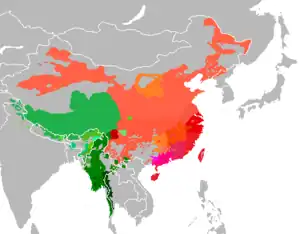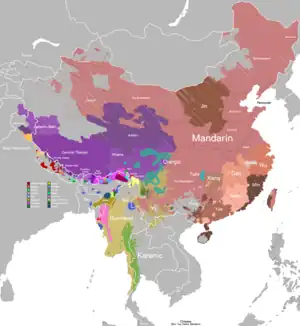East Asian languages
The East Asian languages are a language family (alternatively macrofamily or superphylum) proposed by Stanley Starosta in 2001. The proposal has since been adopted by George van Driem and others.
| East Asian | |
|---|---|
| (proposed, under study) | |
| Geographic distribution | East Asia, South Asia, Southeast Asia, Oceania, Madagascar |
| Linguistic classification | Proposed language family |
| Subdivisions |
|
| Glottolog | None |
Classifications
Early proposals
Early proposals of similar linguistic macrophylla, in narrower scope:[1]
- Austroasiatic, Austronesian, Kra-Dai, Tibeto-Burman: August Conrady (1916, 1922)[2][3] and Kurt Wulff (1934, 1942)[4][5]
- Austroasiatic, Austronesian, Kra-Dai, Hmong-Mien: Paul K. Benedict (1942),[6] Robert Blust (1996),[7] Ilia Peiros (1998)[8]
- Austroasiatic, Austronesian, Kra-Dai, Tibeto-Burman, Hmong-Mien: Stanley Starosta (2001)
Precursors to the East Asian proposal:
- Austro-Tai (Kra-Dai and Austronesian): Gustave Schlegel (1901, 1902),[9][10] Weera Ostapirat (2005)[11][12]
- Austric (Austroasiatic and Austronesian): Wilhelm Schmidt (1906),[13] Lawrence Reid (1994, 2005)[14][15]
Starosta (2005)

Stanley Starosta's (2005)[16] East Asian proposal includes a "Yangzian" branch, consisting of Austroasiatic and Hmong–Mien, to form an East Asian superphylum. However, Starosta believes his proposed Yangzian to be a direct sister of Sino-Tibetan rather than Austronesian, which is more distantly related to Sino-Tibetan as a sister of Sino-Tibetan-Yangzian. He concludes Proto-East Asian was a disyllabic (CVCVC) language spoken from 6,500 to 6,000 BCE by Peiligang culture and Cishan culture millet farmers on the North China Plain (specifically the Han River, Wei River, and central Yellow River areas).[17]
- East Asian
- Austronesian
- (various Formosan branches)
- Extra-Formosan
- Sino-Tibetan-Yangzian
- Sino-Tibetan
- Yangzian
- Austronesian
Starosta (2005) proposes the following Proto-East Asian morphological affixes, which are found in Proto-Tibeto-Burman and Proto-Austronesian, as well as in some morphologically conservative Austroasiatic branches such as Nicobaric.[18]
- *m(V)- 'agent of V-ing'
- *-Vn 'patient of V-ing'
- *sV- 'instrument of V-ing'
- *n(V)- 'perfective'
van Driem (2012)
The following tree of East Asian superphylum (macrofamily) was proposed by George van Driem in 2012 at the 18th Himalayan Languages Symposium, held at the Benares Hindu University.[1][19]
- East Asian
- Austro-Tai
- Austroasiatic
- Himalayan-Yangtzean
- Trans-Himalayan
- Sino-Bodic
- Burmo-Qiangic
- Brahmaputran
- Gongduk, etc.
- Kiranti, etc.
- Yangtzean
- Trans-Himalayan

According to van Driem, the linguistic evidence for the East Asian languages matches the genetic evidence from Y-DNA Haplogroup O.[20] (Further information: Father Tongue hypothesis)
Larish (2006, 2017)
According to Michael D. Larish, the languages of Southeast and East Asia descended from one proto-language (which he calls "Proto-Asian"). Japonic is grouped together with Koreanic as one branch of the Proto-Asian family. The other branch consists of the Austronesian, Austroasiatic, Kra-Dai, Hmong-Mien and Sino-Tibetan languages.[21][22]
- East Asian
- Japano-Koreanic
- Austro-Asian
Vocabulary comparison
Below is a comparison of basic vocabulary items for proto-languages of all 5 East Asian language families.
- Sources
- Proto-Tibeto-Burman: Matisoff (2015)[23]
- Proto-Hmong-Mien: Ratliff (2010)[24]
- Proto-Austroasiatic: Sidwell & Rau (2015)[25]
- Proto-Austronesian: Blust & Trussel (2020)[26]
- Proto-Tai: Pittayaporn (2009)[27]
- Proto-Hlai: Norquest (2007)[28]
- Proto-Kra: Ostapirat (2000)[29]
| Sino-Tibetan | Hmong-Mien | Austroasiatic | Austronesian | Kra-Dai | |||
|---|---|---|---|---|---|---|---|
| gloss | Proto-Tibeto-Burman | Proto-Hmong-Mien | Proto-Austroasiatic | Proto-Austronesian | Proto-Tai | Proto-Hlai | Proto-Kra |
| hair | *(t)sam | *pljei | *suk, *sɔːk | *bukeS | *prɤmA | *hnom | *m-səmA |
| eye | *s-myak | *mu̯ɛjH | *mat | *maCa | *p.taːA | *tʃʰaː | *m-ʈaA |
| ear | *r/g-na | *mbræu | *-toːr | *Caliŋa | *krwɯːA | *ljəy | *k-raA |
| nose | *s-na ~ *s-naːr | *mbruiH | *mɔːh, *muːh, *muːs | *ujuŋ | *ɗaŋA | *kʰət | *hŋətD |
| tooth | *s/p-wa | *hmjinʔ | *lmVɲ, *sraŋ, *p(i)əŋ | *lipen, *n/ŋipen | *wanA | *fjən | *l-pənA |
| tongue | *m/s-lay ~ *s-ley | *mblet | *lntaːk | *Sema, *lidam | *liːnC | *hliːnʔ | *l-maA |
| hand | *lak ~ *C-yak | *-bɔuʔ | *tiːʔ | *kamay | *mwɯːA | *C-mɯː | *mjaA |
| bone | *s/m/g-rus | *tshuŋʔ | *cʔaːŋ | *CuqelaN | *C̥.dukD | *Cuɾɯːk | *dəkD |
| blood | *s-hywəy-t | *ntshjamʔ | *saːm, *ɟhaːm, *(b/m)haːm | *daRaq | *lɯətD | *alaːc | *platD |
| liver | *m-sin | *-hri̯ən | *kləːm, *ris | *qaCay | *tapD | *ɗəy | *təpD |
| meat, flesh | *sya-n | P-Mienic *ʔaB | *sac | *Sesi | *n.mɤːC | *rəmʔ | *ʔaɯC |
| dog | *d-kʷəy-n | P-Hmongic *hmaŋC | *cɔːʔ | *asu | *ʰmaːA | *hmaː | *x-maA |
| bird | *s-ŋak | *m-nɔk | *ciːm, *ceːm | *manuk | *C̬.nokD | *səc | *ɳokD |
| fish | *s-ŋya | *mbrəuʔ | *kaʔ | *Sikan | *plaːA | *hlaː | *p-laA |
| louse | *s-r(y)ik | *ntshjeiʔ | *ciːʔ | *kuCux | *trawA | *tʃʰwəw | *C-ʈuA |
| leaf | *lay | P-Hmongic *mblɔŋA, P-Mienic *nɔmA |
*slaʔ | *waSaw | *ɓaɰA | *ɓɯː | *ɖiŋA |
| sun, day | *s-nəy | P-Mienic *hnu̯ɔiA | *tŋiːʔ | *waRi, *qajaw | *ŋwanA | *hŋwən | *(l-/h)wənA |
| moon | *s/g-la | *hlaH | *khaj | *bulaN, *qiNaS | *ɓlɯənA | *C-ɲaːn | *(C-)tjanA |
| water | *m-t(w)əy-n ~ *m-ti-s | *ʔu̯əm | *ɗaːk; Pal. *ʔoːm | *daNum | *C̬.namC | *C-nəmʔ | *ʔuŋC |
| rain | *r/s/g-wa | P-Hmongic *m-noŋC | *gmaʔ | *quzaN | *C̥.wɯnA | *fun | *jəlA |
| fire | *mey | *douʔ | *ʔuːs, *ʔɔːs | *Sapuy | *wɤjA | *fiː | *puiA |
| name | *r-mi(ŋ/n) | *mpɔuH | *-məh | *ŋajan | *ɟɤːB | *pʰaːŋ | *n(ʒ)iA |
| eat | *m-dz(y)a-k/n/t/s | P-Mienic *ɲənC | *caːʔ | *kaen | *kɯɲA | *kʰən | *kanA |
| die | *səy | *dəjH | *kceːt | *ma-aCay | *p.taːjA | *hlaːwɦ | *pɣonA |
| I | *ŋa-y ~ *ka | P-Hmongic *kɛŋB | *ʔaɲ | -ku | *kuːA | *ɦuː | *kuA |
| you (sg.) | *na-ŋ | *mu̯ei | *miːʔ | -mu | *mɯŋA | *C-mɯː | *məA/B |
Distributions
 Distribution of Sino-Tibetan languages
Distribution of Sino-Tibetan languages Distribution of Kra–Dai languages
Distribution of Kra–Dai languages Distribution of Austroasiatic languages
Distribution of Austroasiatic languages Distribution of Hmong–Mien languages
Distribution of Hmong–Mien languages.png.webp) Dispersal of Austronesian languages
Dispersal of Austronesian languages
See also
Notes and references
- van Driem, George. 2013. "East Asian ethnolinguistic phylogeography Archived 2019-04-29 at the Wayback Machine", Bulletin of Chinese Linguistics, 7 (1): 135-188.
- Conrady, August. 1916. Eine merkw rdige Beziehung zwischen den austrischen und den indochinesischen Sprachen. Aufsätze zur Kultur- und Sprachgeschichte vornehmlich des Orients: Ernst Kuhn zum 70. Geburtstage am 7. Februar 1916 gewidmet von Freunden und Schülern, 475-504. München: Verlag von M. & H. Marcus.
- Conrady, August. 1922. Neue austrisch-indochinesische Parallelen. Asia Major: Hirth Anniversary Volume, 23-66. London: Robsthan and Company.
- Wulff, Kurt. 1934. Chinesisch und Tai: Sprachvergleichende Untersuchungen. Copenhagen: Levin & Munksgaard.
- Wulff, Kurt. 1942 [posthumous]. Über das Verhältnis des Malay-Polynesischen zum Indochinesischen. Copenhagen: Munksgaard.
- Benedict, Paul King. 1942. Thai, Kadai and Indonesia: A new alignment in southeastern Asia. American Anthropologist 44:576-601.
- Blust, Robert. 1996. Beyond the Austronesian homeland: The Austric hypothesis and its implications for archaeology. Prehistoric Settlement of the Pacific, ed. by Ward H. Goodenough, 117-160. Philadelphia: American Philosophical Society.
- Peiros, Ilia. 1998. Comparative Linguistics in Southeast Asia. Canberra: Pacific Linguistics.
- Schlegel, Gustave. 1901. Review: ‘Elements of Siamese Grammar by O. Frankfurter, Ph.D., Bangkok: Printed at the American Presbyterian Mission Press, Leipzig, Karl W. Hiersemann, 1900’. T'oung Pao (Série II), II:76-87.
- Schlegel, Gustave. 1902. Siamese Studies. T'oung Pao, New Series II, Volume II, Supplement. Leiden.
- Ostapirat, Weera. 2005. Kra-Dai and Austronesian: Notes on phonological correspondences and vocabulary distribution. The Peopling of East Asia: Putting Together Archaeology, Linguistics and Genetics, ed. by Laurent Sagart, Roger Blench and Alicia Sanchez-Mazas, 107-131. London: Routledge Curzon.
- Ostapirat, Weera. 2013. Austro-Tai revisited. 23rd Annual Meeting of the Southeast Asian Linguistic Society, Chulalongkorn University, Bangkok, 29 May 2013.
- Schmidt, Wilhelm. 1906. Die Mon-Khmer Völker, ein Bindeglied zwischen Völkern Zentral-Asiens und Austronesiens. Archiv für Anthropologie Neue Folge V:59-109.
- Reid, Lawrence A. 1994. Morphological evidence for Austric. Oceanic Linguistics 33.2:323-344.
- Reid, Lawrence A. 2005. The current status of Austric: a review and evaluation of the lexical and morphosyntactic evidence. The Peopling of East Asia: Putting Together Archaeology, Linguistics and Genetics, ed. by Laurent Sagart, Roger Blench and Alicia Sanchez-Mazas, 132-160. London: Routledge Curzon, London.
- Since Starosta died on July 18, 2002, his paper, originally written in 2001, was published posthumously.
- Starosta, Stanley (2005). "Proto-East Asian and the origin and dispersal of languages of east and southeast Asia and the Pacific". In Sagart, Laurent; Blench, Roger; Sanchez-Mazas, Alicia (eds.). The Peopling of East Asia: Putting Together Archaeology, Linguistics and Genetics. London: Routledge Curzon. pp. 182–197. ISBN 978-0-415-32242-3.
- Reid, Lawrence A. (1994). "Morphological evidence for Austric" (PDF). Oceanic Linguistics. 33 (2): 323–344. doi:10.2307/3623132. hdl:10125/32987. JSTOR i285831. Archived (PDF) from the original on 2017-08-15. Retrieved 2020-08-10.
- van Driem, George. 2016. "The Eastern Himalayan corridor in prehistory Archived 2018-10-09 at the Wayback Machine", pp. 467-524, Vol. II in Elena Nikolaevna Kolpačkova, ed., Проблемы китайского и общего языкознания — Problems in Chinese and General Linguistics. St. Petersburg: Izdatel’stvo Studija « NP-Print ».
- van Driem, George. 2018. "The East Asian linguistic phylum: A reconstruction based on language and genes Archived 2021-01-10 at the Wayback Machine", Journal of the Asiatic Society, LX (4): 1-38.
- Larish, Michael D. (January 2006). Possible Proto-Asian Archaic Residue and the Statigraphy of Diffusional Cumulation in Austro-Asian Languages (PDF). Tenth International Conference on Austronesian Linguistics. Archived (PDF) from the original on 2019-01-08. Retrieved 2019-01-07.
- Larish, Michael. 2017. Proto-Asian and its branches: An archeolinguistic approach for the history of Eastern Asia. Linguistic Society of the Philippines.
- Matisoff, James A. 2015. The Sino-Tibetan Etymological Dictionary and Thesaurus Archived 2020-10-23 at the Wayback Machine. Berkeley: University of California. (PDF Archived 2020-02-02 at the Wayback Machine)
- Ratliff, Martha. 2010. Hmong–Mien language history. Canberra, Australia: Pacific Linguistics. ISBN 0-85883-615-7.
- Sidwell, Paul and Felix Rau (2015). "Austroasiatic Comparative-Historical Reconstruction: An Overview." In Jenny, Mathias and Paul Sidwell, eds (2015). The Handbook of Austroasiatic Languages. Leiden: Brill.
- Blust, Robert; Trussel, Stephen (June 21, 2020). "Austronesian Comparative Dictionary, web edition". Archived from the original on August 6, 2020. Retrieved November 10, 2020.
- Pittayaporn, Pittayawat. 2009. The Phonology of Proto-Tai. Ph.D. dissertation. Department of Linguistics, Cornell University.
- Norquest, Peter K. 2007. A Phonological Reconstruction of Proto-Hlai Archived 2016-03-03 at the Wayback Machine. Ph.D. dissertation. Tucson: Department of Anthropology, University of Arizona.
- Ostapirat, Weera. 2000. "Proto-Kra Archived 2020-11-12 at the Wayback Machine." Linguistics of the Tibeto-Burman Area 23 (1): 1-251.
